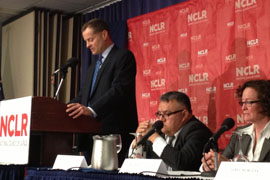Advocates say path to citizenship is path to brighter economy for all

 By Nela Lichtscheidl
By Nela Lichtscheidl
Cronkite News
WASHINGTON – Immigration advocates released a study of Latino banking habits Tuesday that they said supports the case for a pathway to citizenship, which they said in turn opens the door to greater economic prosperity for all.
The report studied Latinos in California and found, among other things, that they are more engaged financially and more likely to invest if they are naturalized citizens.
“Citizenship allows our country to reap the full benefits of immigration and achieve the goal of successfully integrating immigrants into our social fabric,” said Janet Murguia, CEO and president of the National Council of La Raza, which did the report.
“Our new report shows that it (citizenship) leads to greater financial inclusion … that is the path to economic empowerment and upper social mobility and economic mobility,” Murguia said.
Reasons like those are why citizenship “is important to all of us,” said Murguia, who insists that a simpler naturalization process will in essence lead the country to a financially brighter future.
But opponents of immigration reform challenged the La Raza study, saying that, far from leading to a financially brighter future, it will actually be a drain on the economy in the long run.
“Organizations like La Raza are falling back on the argument that more people means a larger economy in the form of increased GDP (gross domestic product),” said Kristen Williamson, a spokeswoman for the Federation for American Immigration Reform.
She said even those who argue that reform will benefit the economy “only show relatively minor economic growth.”
“(They) completely ignore the fiscal costs associated with amnesty for generally low-income, low-educated illegal aliens and admitting nearly 2 million legal immigrants a year,” Williamson said.
FAIR and other opponents of immigration reform argue that the bill currently under consideration does not prevent the problem of illegal immigration “from occurring in the future. The Senate bill rewards law-breaking, encourages more, and is fundamentally unfair to those who play by the rules.”
But Murguia and others said the rules are unduly burdensome for those already here. Many people in their survey who did not pursue naturalization said they could not afford it, the report said. The bill under consideration does not make things easier, they said.
“We have been adamant with policymakers that a path to citizenship and legality has to be at the core of any legislation,” said Murguia, who said the bill needs work to reinforce and strengthen the naturalization process.
Raul Raymundo, CEO of the Resurrection Project, said that citizenship is the steppingstone toward a conscientious and fiscally involved citizen, which is “ultimately … good for the economy.”
Raymundo pointed to the La Raza report to support the claim that a clear naturalization process leads to a better economy.
“Studies have shown that once you are a U.S. citizen you’re going to be more engaged in this country,” he said. “You will invest in long term, for education, opening up a business, and so on. So why not create better paths for legalization that ultimately lead toward citizenship?”
Raymundo and others say they will continue to advocate for a simpler path to citizenship, which they argue is best for immigrants and the country alike.
“As people … move to a path of citizenship, they’re able to become much more productive legal residents, and eventually citizens that are going to drive this economy and sustain it in the most robust way,” he said.
Murguia said there is still work to be done.
“We are one step closer to reform, but we are not done yet,” she said. “We remain committed to see this through.”














